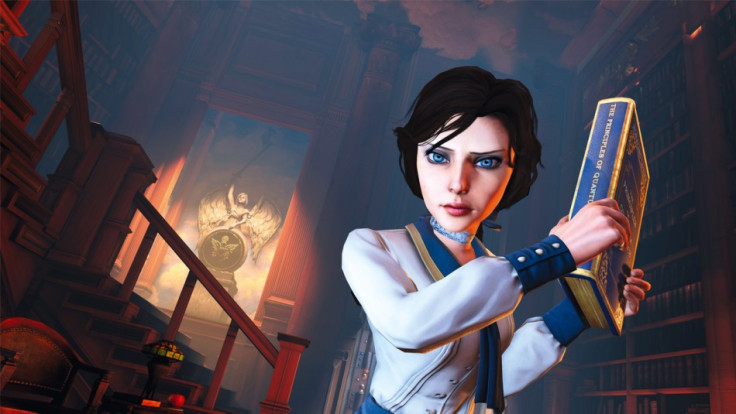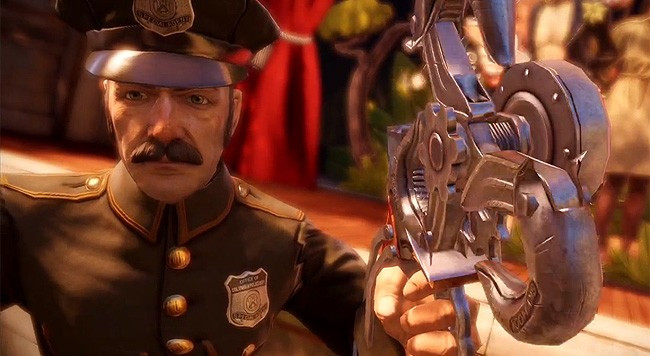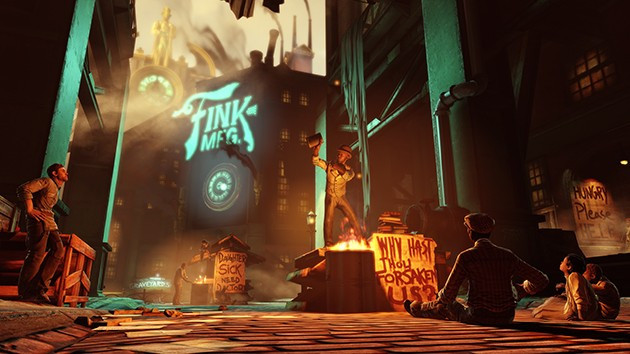BioShock Infinite - Critical Roundup
Critics divided over racism and violence in new BioShock
BioShock Infinite launched on 26 March to rave reviews though critics remain split over the game's high levels of violence and treatment of American history. Here, we round-up essays and articles dedicated to exploring Infinite's more complex problems.

I had an email from Irrational's PR earlier this week explaining that the developer was compiling BioShock Infinite reviews, and asking me to send mine. The response I got said it was interesting to read how I wasn't "overly enamoured" with the writing.
I emailed back saying that despite some of the comments in my review, the fact I could talk about Infinite for hours with my friends meant that, actually, I probably was enamoured with it. This seems to be the way most people feel about the game.
Put another way, reception to BioShock Infinite has been mixed. Despite superlative reviews on launch day, leading to the game's now oft-quoted 94 point score on Metacritic, critics have been raising issue with Infinite's treatment of political and racial issues, calling the game out for side-lining these more serious topics in favour of its flashier sci-fi meta-narrative.
There's also been plenty said about that old chestnut "ludonarratological dissonance", ergo, the way Infinite often parks its quite lofty story in favour of long, dumb shooting matches. There's too much killing, basically. BioShock Infinite purports these high ideas about religion vs state, rich vs poor, white vs black, but too regularly devolves into a cut and dry shooter. People say it feels jarring.
Gamasutra Editor-at-Large Leigh Alexander summed up her feelings about this on her blog, Sexy Videogame Land:
"Infinite intends to reek of quaint Americana, the innocence of cotton candy, boardwalks, Independence Day relics. Yet its spark is absent. It's pale, smudged at its edges, bright in the wrong places.
"Every exploration is stymied by a velvet rope, every promising corridor just leads to a restroom, a gift shop. The secret stink of money is all over everything. At every turn, a pile of trunks and crates that let you know a modern war lies ahead. It's a place to kill and be killed in.
"It's not even that I wish it wasn't a shooter, or that there was no combat. BioShock the first was a combat game, and even though I think killing is the laziest mechanic known to game creation, it had a weight, a necessary friction.
"It's that Infinite's is a sterile, mechanized system that could have been ripped from any other listless hyper-modern game like a bloody spine and grafted messily onto this vision, obscuring it. It doesn't even do it well; I wouldn't even say competently. Its inconvenient clutter obscures the vista, depersonalizes it, without even the grace of providing meaningful cover."
Colin Snyder writing for Vice also had problems with Infinite's violence:
"BioShock Infinite sets out to explore the issue of racism. But it just comes off a little brutish, potentially because just before and after meaningful moments in the story that play with the idea of racism, you have to mow down whichever side of this civil war isn't trying to kill you, be that Columbia's rich white police force or the downtrodden yet violent Irish and Black 99 percenters, Vox Populi.

"One time in Finktown, a shanytown for factory workers, I saw a bunch of people in line for something that looked like a desk. I saw something I wanted--a vial--just behind the man at the desk. This apparently was a storefront, and by stepping over an invisible line these men, whom I now realize were trying to distribute food, pulled out shotgun, engaging in combat with me. I can't apologise. I can run away--which I did, but when I emerged from the bar I'd holed up in, they were waiting for me. I had no choice but to kill them--men, distributing food to the poor. I swear I saw a tutorial message at the beginning of the game that said I could avoid fights whenever possible, but those moments didn't happen in my playthrough."
Erik Kain of Forbes was more sympathetic toward Infnite's use of violence:
"BioShock Infinite needed to be a first-person shooter. It needed to have shooting and violence. It would have been weird to lose that stuff. What it should have done is allow that shooting and violence to be more brief, more meaningful, and ultimately more in keeping with the rest of the game's polish and refinement-not because it was too violent, but because all that shooting is getting boring and silly at this point.
"Add in more platforming, more puzzling, more challenge beyond the fighting, and you have a pretty perfect gaming experience, regardless of how violent it is.
"Ultimately, like much of the sexism we see in video games, this is a failure and of storytelling in the medium. It may be that we notice it so much in BioShock Infinite because that game does such a good job at telling a story in almost every other way."
Continuing to look at that "brutish" exploration of racism that Snyder mentions, Daniel Golding, writing for Australia's ABC Arts says that BioShock Infinite uses historical events as "window-dressing" and masquerades as intelligent:
"The first major choice that players of BioShock Infinite are presented with is whether they would like to publicly punish an interracial couple or not. You may choose to throw a ball at the couple, who are tied up in front of a crowd at a fair, or you may choose to throw the ball at the man who is asking you to do so. The outcome of your choice is mostly the same.

"These are the complex and difficult decisions found in videogames in 2013: would you like to be in the Ku Kux Klan or would you like to be Abraham Lincoln? Would you like to join the Nazi party or found the United Nations? Would you like to be for or against?
"In taking the game seriously, I want to be as clear as possible: BioShock Infinite uses racism for no other reason than to make itself seem clever. Worse, it uses racism and real events in an incredibly superficial way - BioShock Infinite seeks not to make any meaningful statement about history or racism or America, but instead seeks to use an aesthetics of 'racism' and 'history' as a barrier to point to and claim importance.
"BioShock Infinite presents a veneer of intelligence-with wholly unexplored and mystifying asides to complicated concepts like Manifest Destiny and the New Eden-without ever following through. Without any deeper exploration of these ideas, BioShock Infinite's use of American history and the Columbian Exposition is illusory, and already puts the lie to the claim that by engaging with these themes, BioShock Infinite is the place to find substance in mainstream videogames.
"You do not engage with this kind of material if you want to make something disposable."
In response to Golding's article, Ben Kuchera of Penny Arcade wrote defending BioShock Infinite:
"I disagree that the player is asked to be either a Klan member or Lincoln in that first decision whether to throw the ball or not. The issue in this scene isn't racism, not really. The issue is how hard it is to do the right thing when so many people are watching and expecting you to do the wrong thing.
"Society has swung back the other way against racism, at least in most parts of the country, and we can sit in our basement and cluck our tongues and feel terrible about some of the scenes of Bioshock Infinite, but it also allows us to see the repercussions of speaking out when the crowd is not on your side. Booker is behind enemy lines in the game, and that makes it much harder to "be Lincoln," as the article suggests.
"It's the same thing with the museum displays that dehumanize those of other races. This isn't an empty design decision, meant to demonize the "bad guys" of the game, it's a sad reminder that history is written by the winners.
"Bioshock Infinite is not the best game ever made, but thought did go into how to deal with tricky subjects, and that makes it much better than most."
© Copyright IBTimes 2024. All rights reserved.







